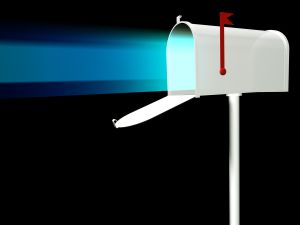Fight E-Mail Tyranny!
By Robert Middleton
On Sunday evening while browsing
our local Santa Cruz bookstore I came across
a wonderful book: The Tyranny of Email
by John Freeman.
Freeman spends the first six chapters of the book making
a powerful case for one rather sobering insight: We are all
hopelessly addicted to email. It has taken over our lives
and we have virtually no strategies to manage it.
The good news is that in the final chapter, "Don't Send," he
presents ten prescriptions for breaking the email addiction
and handling email with a degree of sanity. I'll summarize
them here, but if you want the full impact, get the book!
1. Don't Send
Email begets email. The more you send, the more you get.
So before you send an email message, take a few seconds
to think: How essential is this email? What's it's purpose? Could I combine email
messages to a single recipient in response to several
emails? It is urgent or could it wait? So slow things down a bit and don't be so reactive.
Send email intentionally.
2. Don't Check it First Thing in the Morning or Late at Night
Don't you have a business so that you can have a life? And if the very first thing you
do in the day is check email, you are a slave to email, not to your priorities. Much
better to take some time to plan your day, look at the appointments and priorities
YOU have first and plan how you're going to get them done. Focus on the big stuff and
then email can fit more easily between the cracks.
3. Check it Twice a Day
We often check our email several times an hour. The truth is, it's not necessary. You
won't actually get behind. Better to schedule time to "handle" email, so you can do it
more completely. Can't reduce it to two times a day? Try three or at the most, hourly.
4. Keep a written To-Do List and Incorporate Email into it
Your best time management tool is a simple to-do list. I make a weekly list of about 5
to 10 major items I want to complete that week and then a daily list of 2 or 3 priority
items for that day. Email is something I fit between these priorities but don't let it
dominate my day.
5. Give Good Email
The best emails are short, concise and clear. After all, email is about communication
not a deluge of information. Take an extra minute to proof your email, make sure the
message is clear and also makes a specific request or promise for action. Include your
phone number in your email signature so that they can easily call you if needed. I also
proof my email for typos and format the email for easy readability such as using bold
type.
6. Read the Entire Incoming Email Before Replying
We've all done it. We scan an email quickly and dash off a reply. Then we read the
bottom part we missed and realize our response was incomplete. So we send another
email. Meanwhile you've gotten an email back, trying to clarify this... Again, the key is
to do email intentionally. Write and respond with the intention of moving something
forward without confusion.
7. Do Not Debate Complex or Sensitive Matters by Email
Sometimes you just need to pick up the phone. Nuances of emotion are hard to
express in writing. Especially when you're in the habit of dashing off emails quickly.
Remember that you havea relationship with your correspondent. Treat that
relationship with care, and communicate in a way that will get the best outcome.
Besides, a quick phone call can often be faster than writing an email.
8. If You Have to Work as a Group by Email, Meet Your Correspondents Face-to-Face
In my one-year Marketing Mastery Program we connect by teleconference, email and
phone. But I also hold a 3-day workshop at the beginning of the program so that
people can connect person-to-person. They get to know each other, feel more
comfortable with everyone and a more powerful community is created this way. When
they send emails after the workshop, they are no longer emailing to strangers.
9. Set Up Your Desk to Do Something Else Besides Email
A big desk helps. My computer is in the middle of a v-shaped desk and I have four
feet on each side of the computer for my planning books, for taking notes, for my
laptop computer that acts as my "jazz jukebox," etc. Yes, the computer is the central
hub of my business, but lots of space leaves me options to do other things than be on
my computer.
10. Schedule Media-free Time Every Day
What do we do after our full day at our computers? We visit Facebook, watch TV and
play video games! We are not only addicted to email, we are addicted to electronic
media to the point of obsession. I include myself in this. If you don't have a TV, I honor
you! But for the sake of your own well being, make sure to unplug for several hours a
day. If you don't, you're opening thedoor for serious stress issues.
By Robert Middleton of Action Plan Marketing. Please visit Robert's web site at Action Plan
Marketing for additional marketing articles and resources on marketing for professional service
businesses.
By Robert Middleton
On Sunday evening while browsing
our local Santa Cruz bookstore I came across
a wonderful book: The Tyranny of Email
by John Freeman.
Freeman spends the first six chapters of the book making
a powerful case for one rather sobering insight: We are all
hopelessly addicted to email. It has taken over our lives
and we have virtually no strategies to manage it.
The good news is that in the final chapter, "Don't Send," he
presents ten prescriptions for breaking the email addiction
and handling email with a degree of sanity. I'll summarize
them here, but if you want the full impact, get the book!
1. Don't Send
Email begets email. The more you send, the more you get.
So before you send an email message, take a few seconds
to think: How essential is this email? What's it's purpose? Could I combine email
messages to a single recipient in response to several
emails? It is urgent or could it wait? So slow things down a bit and don't be so reactive.
Send email intentionally.
2. Don't Check it First Thing in the Morning or Late at Night
Don't you have a business so that you can have a life? And if the very first thing you
do in the day is check email, you are a slave to email, not to your priorities. Much
better to take some time to plan your day, look at the appointments and priorities
YOU have first and plan how you're going to get them done. Focus on the big stuff and
then email can fit more easily between the cracks.
3. Check it Twice a Day
We often check our email several times an hour. The truth is, it's not necessary. You
won't actually get behind. Better to schedule time to "handle" email, so you can do it
more completely. Can't reduce it to two times a day? Try three or at the most, hourly.
4. Keep a written To-Do List and Incorporate Email into it
Your best time management tool is a simple to-do list. I make a weekly list of about 5
to 10 major items I want to complete that week and then a daily list of 2 or 3 priority
items for that day. Email is something I fit between these priorities but don't let it
dominate my day.
5. Give Good Email
The best emails are short, concise and clear. After all, email is about communication
not a deluge of information. Take an extra minute to proof your email, make sure the
message is clear and also makes a specific request or promise for action. Include your
phone number in your email signature so that they can easily call you if needed. I also
proof my email for typos and format the email for easy readability such as using bold
type.
6. Read the Entire Incoming Email Before Replying
We've all done it. We scan an email quickly and dash off a reply. Then we read the
bottom part we missed and realize our response was incomplete. So we send another
email. Meanwhile you've gotten an email back, trying to clarify this... Again, the key is
to do email intentionally. Write and respond with the intention of moving something
forward without confusion.
7. Do Not Debate Complex or Sensitive Matters by Email
Sometimes you just need to pick up the phone. Nuances of emotion are hard to
express in writing. Especially when you're in the habit of dashing off emails quickly.
Remember that you havea relationship with your correspondent. Treat that
relationship with care, and communicate in a way that will get the best outcome.
Besides, a quick phone call can often be faster than writing an email.
8. If You Have to Work as a Group by Email, Meet Your Correspondents Face-to-Face
In my one-year Marketing Mastery Program we connect by teleconference, email and
phone. But I also hold a 3-day workshop at the beginning of the program so that
people can connect person-to-person. They get to know each other, feel more
comfortable with everyone and a more powerful community is created this way. When
they send emails after the workshop, they are no longer emailing to strangers.
9. Set Up Your Desk to Do Something Else Besides Email
A big desk helps. My computer is in the middle of a v-shaped desk and I have four
feet on each side of the computer for my planning books, for taking notes, for my
laptop computer that acts as my "jazz jukebox," etc. Yes, the computer is the central
hub of my business, but lots of space leaves me options to do other things than be on
my computer.
10. Schedule Media-free Time Every Day
What do we do after our full day at our computers? We visit Facebook, watch TV and
play video games! We are not only addicted to email, we are addicted to electronic
media to the point of obsession. I include myself in this. If you don't have a TV, I honor
you! But for the sake of your own well being, make sure to unplug for several hours a
day. If you don't, you're opening thedoor for serious stress issues.
By Robert Middleton of Action Plan Marketing. Please visit Robert's web site at Action Plan
Marketing for additional marketing articles and resources on marketing for professional service
businesses.
Home Office Weekly is a BackPorch Publishing site Join Us Today! Marcia Passos Duffy, Publisher & Editor Author of Be Your Own Boss 301 Moved Permanently |
|
| home | business tips| office space | time tips| home life|inspiration|art|books|tools|site map|about us |


